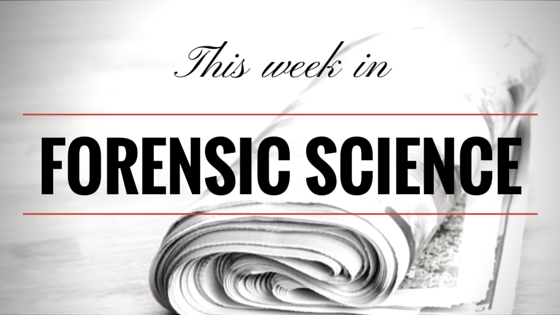No one has hours to scour the papers to keep up with the latest news, so we’ve curated the top news stories in the field of Forensic Science for this week. Here’s what you need to know to get out the door!
The Disconnect Between Science and Law – and How the Past Can Fix It (Forensic Magazine – 2/17/2017)
You know that famous saying—those that fail to learn from history are doomed to repeat it? While it can be applied to numerous situations, the forensic professionals at the 69th Annual American Academy of Forensic Sciences (AAFS) meeting are taking it to heart.
Va. Beach Rape Kits Get Hits in CODIS DNA Database (13 News Now – 2/17/2017)
Rape victims in Hampton Roads are one step closer to justice.
13News Now has uncovered the results of newly-tested rape kits from some of our local police departments, and they match suspects in the national database.
Many Scientists Take a Dim View of the Court System – Until They Take Part In It (Science – 2/18/2017)
That impression of the legal system—as absolutist, adversarial, and unconcerned with scientific nuance—has been around for decades. But how common is the view among scientists, and how does it change after the experience of testifying or consulting on a case?
Forensics Can Tackle Borderless Crimes (The Times of India – 2/19/2017)
- Around 50 delegates from 32 African countries met at Gujarat Forensic Sciences University (GFSU) on Saturday and discussed the importance of forensic science in crime detection and prevention in the global context.
Judges, Lawyers and Scientists: Why Can’t We All Just Get Along? (Forensic Magazine – 2/19/2017)
While the answer to the question “why can’t we all just get along?” may seem complicated, the Honorable Donald Shelton appeared to sum up the answer in one simple phrase last week during his jurisprudence session at the 69th Annual American Academy of Forensic Sciences conference.
GBI Plans for New Regional Crime Lab to Address Growing Population, Caseload (Savannah Now – 2/20/2017)
Expert Witnesses: Science Friction (The Law Society Gazette – 2/20/2017)
Bills that Allow Police to Take DNA Upon Arrest Advance (IndyStar – 2/21/2017)
Two bills that would allow police to take DNA samples from people who are arrested, but not yet convicted, are steadily advancing — but lawmakers have added safeguards for people who may have been falsely accused.
Researchers Reconstruct Face of Pictish Man ‘Brutally Murdered’ 1,400 Years Ago (Forensic Magazine – 2/21/2017)
Researchers from the University of Dundee’s Centre for Anatomy and Human Identification (CAHID) have reconstructed the face of a Pictish man they showed to have been brutally murdered 1,400 years ago.
Search in Perth for Remains of Murdered James I (BBC News – 2/21/2017)
A plan to search for the tomb of a Scottish king buried in Perth nearly 600 years ago has been unveiled.
Cutting-Edge DNA Analysis Adds New Insight to Three Centuries of Pueblo History (UVA – 2/21/2017)
- A single small burial room in the ruins of Pueblo Bonito in Chaco Canyon held the richest cache of rare and valuable materials – turquoise, silver, abalone and conch shells – ever found in the American Southwest.
National Commission on Forensic Science Asks for Public Comment (Forensic Magazine – 2/22/2017)
The National Commission on Forensic Science (NCFS) is the first federal agency to weigh in on the direction of the “forensic overhaul” in the Trump era.
The NCFS has issued two draft reports that have come from their last meeting in January, less than two weeks before the inauguration of President Donald Trump. The commission is asking for public comment through next month.
Female Forensics Team in Glendale Credited with Solving High-Profile Southland Crimes (ABC 7 – 2/22/2017)
Two murder cases are only the most recent Southland crimes solved by the Glendale Police Department’s nearly all-female forensics team.
Neanderthal DNA Contributes to Human Gene Expression (Phys Org – 2/23/2017)
The last Neanderthal died 40,000 years ago, but much of their genome lives on, in bits and pieces, through modern humans. The impact of Neanderthals’ genetic contribution has been uncertain: Do these snippets affect our genome’s function, or are they just silent passengers along for the ride? In Cell on February 23, researchers report evidence that Neanderthal DNA sequences still influence how genes are turned on or off in modern humans. Neanderthal genes’ effects on gene expression likely contribute to traits such as height and susceptibility to schizophrenia or lupus, the researchers found.
Bill Would Expand How Police Can Collect DNA (KING 5 – 2/23/2017)
A Tacoma detective is fighting to change state law to make it easier for law enforcement to solve crimes and bring closure to families.
Man Wrongly Convicted with Bite Mark Evidence Confronts Bite Mark Analysts (The Washington Post – 2/16/2017)
Keith Harward was wrongly convicted of a grisly rape and murder and spent more than 33 years in prison. The main evidence against him were alleged bite marks found on the victim. Over the course of two trials, six bite mark analysts said the marks were a match to Harward’s teeth. He was finally cleared by DNA testing last year.
WOULD YOU LIKE TO SEE MORE ARTICLES LIKE THIS? SUBSCRIBE TO THE ISHI BLOG BELOW!
SUBSCRIBE NOW!


